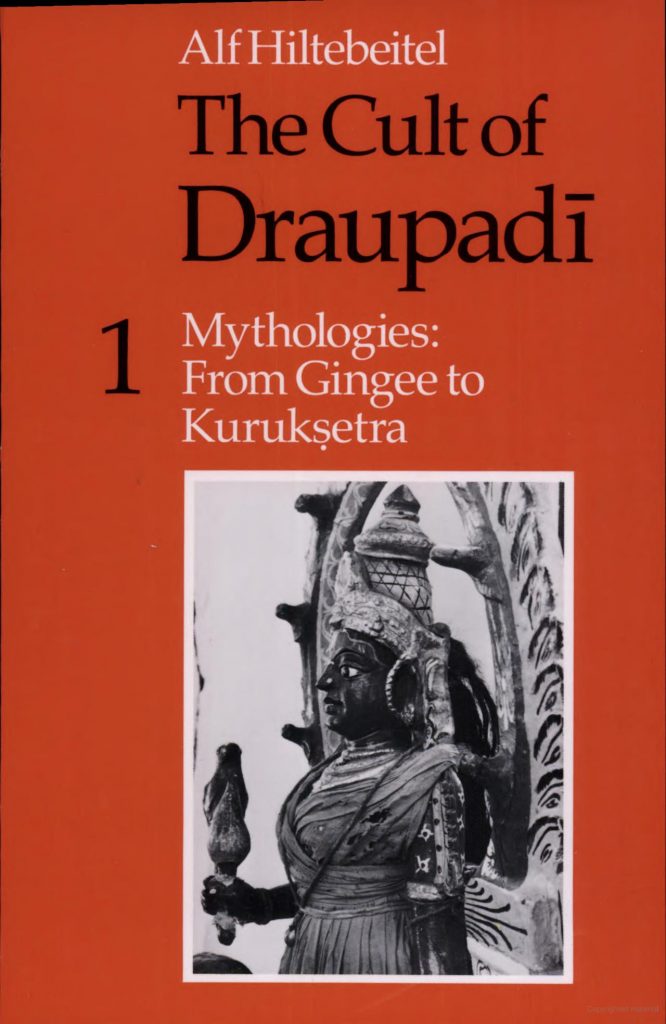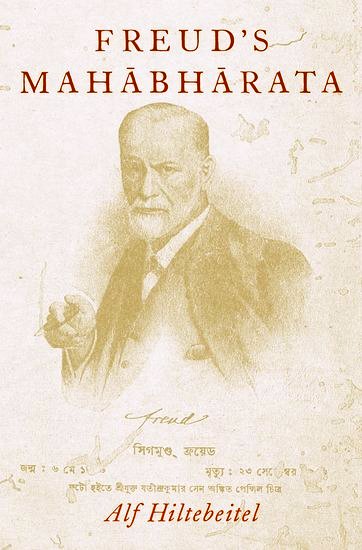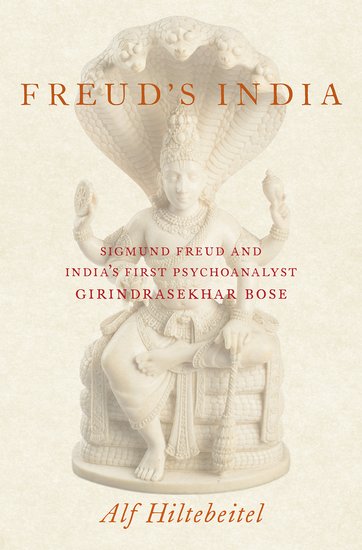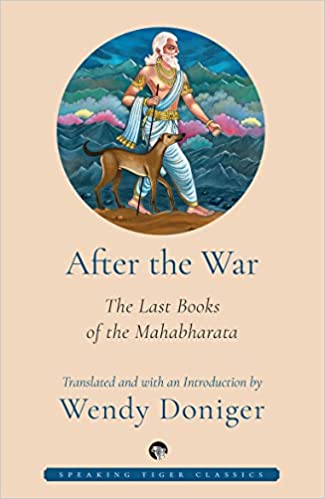
Alf Hiltebeitel: The Cult of Draupadi: Mythologies from Gingee to Kurukshetra Vol.1 (Motilal Banarasidass, Delhi, pp.487, Rs.200/-)
The 1980s witnessed a remarkable resurgence of Indian mythology in literary, theatrical and academic spheres. If in literature we saw the gripping Hindi dodecalogy of Ram Kumar Bhramar on the Mahabharata while novels on the epic came in Bengali from Kalkut and Dipak Chandra, in Oriya from Pratibha Ray, in Kannada from S.L. Bhyrappa, and in English from Maggi Lidchi Grassi and Elaine Aron, on the stage the agony of Draupadi, five-husbanded-yet-husbandless, was unforgettably brought home in Shaoli Mitra’s one-woman performance, Nathavati anathavat. In academia, Dr. Alf Hiltebeitel produced the first volume of his profound study of the cult of Draupadi in 1988 which is now finally available in an Indian edition from Motilal Banarsidass.
Tracing the South Indian cult of Draupadi to Gingee (it also exists in Sri Lanka, Fiji and Singapore), Hiltebeitel launches an elaborate investigation into how it incorporates dimensions of a multiplicity of cults relating to village goddesses, heroes, lineage/caste/boundary deities, possession and even those of the supreme triad of the Hindu pantheon: Brahma, Vishnu, Shiva. The Draupadi cult is a fascinating combination of the folk and the classical traditions, which the scholar investigates chiefly through the Terukkuttu dramas (street plays) reaching out to the classical and vernacular epic traditions as well as analogous cults for further insights. To provide a focus for this considerably involved phenomenon Hiltebeitel inspiredly seizes upon an 18 verse invocatory song sung at the beginning and the end of Draupadi festivals. It is the ramifications of these 18 verses that are brought out painstakingly in the study, of which this is only the first volume.
Hiltebeitel finds that Draupadi is actually a multi-form of Durga and Kali as Vira Shakti/Vira Panchali with her virginity repeatedly stressed. In this aspect, her power is destructive and dangerous even to her husbands. Her children are born out of drops of blood pierced out of Bhima’s hand with her nails as she returns after nocturnal foraging. Like her sister-goddess Ankalamman, whose cult shares the same region, Draupadi roams Kali-like in forests and crematoria. The Telegu tradition has Krishna explain to Bhima that Draupadi is the primal Shakti whom he had promised to satiate with human flesh and that is why he has arranged the Kurukshetra War, during which she roams the battlefield at night consuming corpses. Sensing that Krishna has lent part of his energy to Bhima to solve his problem of satisfying her sexually, Draupadi demands that Krishna now marry her, which he promises to do in future as Jagannatha of Puri. To Hiltebeitel it remains a mystery how this promise is kept.
However, the answer is available in Charolette Vaudeville’s 1982 paper on ‘Krishna and the Great Goddess’ in The Divine Consort which notes that Ekanamsa/Subhadra/Durga is found in the consort’s position, that is the left side, of Jagannatha when the icon of Baladeva is absent, and that the original temple in Puri was occupied by Maha-bhairavi Adishakti under the name Vimala-devi. Draupadi’s Shakti aspect is conclusively established at the end of the Terukkuttu cycle in the stance Draupadi takes atop Duryodhana’s thigh or chest, like Durga atop Mahishasura, pulling out his intestines while Krishna braids her hair. The 18-day war covered by the Terukkuttu cycle marks the end of a festival that can, therefore, be said to recapitulate the Navaratri or Vijayadashami festival of Durga.
In Draupadi’s victory a critical role is played by the folk-figure of Pottu Raja/Pormannan, the Buffalo-demon/king turned devotee, who brings her the five instruments required for her victory. A unique feature of the cult is the icon of the Muslim devotee Muttal Ravuttan who is analogous to the Marathi Khandoba. Draupadi defeats Muttal is after he has imprisoned the Pandavas and becomes the guardian of the north. Another fascinating instance of local myth-making is the second birth of Draupadi invoked by King Cunitan (Sunitha), a descendant of the Pandavas, to save the kingdom from the hundred-headed demon Rochakan/Acalamman. As the demon has the boon that whoever cuts off his hundredth head will die if it touches the ground, Pottu Raja agrees to hold it forever. At the spot where Draupadi disappeared after killing the demon, the Gingee temple was built with a figure of Pottu Raja before it holding the demon’s head. Hiltebeitel perceptively notes how the cult splits into two the functions of Bhairava: the role of the dog who keeps the blood of Brahma’s head from touching the ground and the position of kshetrapala go to Muttal Ravuttan; the all-destroying Brahmic head stuck to his hand goes to Pottu Raja, keeping in hold the destructive power and reminding us of the severed head of the buffalo-demon Mahisha.
The Terukkuttu cycle also reveals a different facet of Krishna. His overwhelming concern is that the Pandavas fulfil their war vows without being upstaged by their sons who are seen as rakshasic. Hence, he brings about the deaths of Aravan (Iravan), Ghatotkacha, Abhimanyu ‘ each of whom would have destroyed the Kaurava army in a day ‘ and of Draupadi’s five sons.
There are a couple of issues that remain unresolved in Hiltebeitel’s thesis. On page 323, he speaks of the coalescence of serpent and elephant in Aravan’s ancestry by making out that Ulupi belongs to the line of Airavata ‘the elephant mount of Indra.’ This is incorrect. This Airavata is the name of a serpent and is not identical with Indra’s mount, as the Adi Parva of the epic makes abundantly clear while listing the major serpents. On page 397, he expatiates on the theme of flawed caste-character of the five Kaurava generals, which certainly cannot apply to Bhishma and Shalya. He does not provide any evidence for the alleged rakshasic nature of Draupadi’s sons. Again, on page 288 he states that only Villi has the nelli (myrobalan) episode in which Draupadi’s desire for a sixth husband is exposed. However, this occurs also in the Bengali Mahabharata composed by Kashiram Das where, using a mango, Krishna gets Draupadi to confess her desire for Karna as her sixth husband. While elaborating the South Indian myths about Krishna’s role in Karna’s death he does not take into account the rich myths regarding the last moments of Karna prevalent in the vernacular traditions in western and eastern India which enhance his nobility to sublime heights as in the Bengali play Nara Narayana by Kshirodeprasad Bidyabinode and in Shivaji Sawant’s epic Marathi novel Mrityunjay.
These, however, hardly detract from the major contribution made by Dr. Hiltebeitel to the understanding of our own mythic traditions ‘about which our own intelligentsia are criminally insouciant’, as kept alive even in the twenty first century through the folk theatre, which is swiftly dying out in the absence of financial support. Enriched with 34 invaluable plates recording key events in Terukkuttu performances and a number of maps laying out the cult territory, this thesis ought to awaken the South Zone Cultural Centre to the need of reviving our dying tradition by providing the necessary support. Otherwise Draupadi the goddess might again have to bewail her fate as nathavati anathavat, ‘many-husbanded yet husbandless’!


